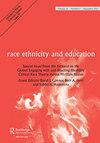在教育研究中使亚裔美国人人性化
IF 2
2区 教育学
Q1 EDUCATION & EDUCATIONAL RESEARCH
引用次数: 0
摘要
在本文中,四位亚裔美国教师分别在美国不同地区、处于终身教职申请的不同阶段,从学术角度讲述了他们在学术领域的个人经历,以期为教育研究中的亚裔美国人人性化做出贡献。这些叙事构成了一个集体的反故事,抵制亚裔美国人作为一个整体的种族化。通过分析这些叙事,作者指出了在教育研究中对亚裔美国人进行人性化对待的障碍和支持。集体反故事抵制忽视、掩盖或重新定义最近重新抬头的反亚裔暴力的非历史观点,将其与更大的系统性种族主义历史分开。作者认为,在教育研究中赋予亚裔美国人人性化,对于揭示和解决建立在白人至上主义基础上的教育不平等至关重要。通过对学术叙述中出现的主题的讨论,作者最后为关注亚裔美国人的研究人员以及教育研究提出了建议。关键词:亚裔美国人种族教师学者个人叙事反故事高等教育披露声明作者未报告潜在的利益冲突。本文章由计算机程序翻译,如有差异,请以英文原文为准。
Humanizing Asian Americans in educational research
ABSTRACTIn this article, four Asian American faculty, working at different stages of the tenure-track/tenured pipeline and different regions of the United States, provide scholarly personal narratives about their experiences in academe to contribute to humanizing Asian Americans in educational research. The narratives comprise a collective counter-story that resists the racialization of Asian Americans as a monolith. Analyzing the narratives, the authors identify barriers to and supports for humanizing Asian Americans in educational research. The collective counter-story resists ahistorical views that overlook, gloss over, or reframe the recent resurgence of anti-Asian violence as separate from a larger history of systemic racism. The authors argue that humanizing Asian Americans in educational research is critical for uncovering and addressing educational inequities built on White supremacy. Through a discussion of themes that emerged across the scholarly narratives, the authors conclude with recommendations for Asian American-focused researchers, as well as educational research.KEYWORDS: Asian Americanracefacultyscholarly personal narrativecounterstoryhigher education Disclosure statementNo potential conflict of interest was reported by the author(s).
求助全文
通过发布文献求助,成功后即可免费获取论文全文。
去求助
来源期刊

Race Ethnicity and Education
Multiple-
CiteScore
6.40
自引率
12.00%
发文量
39
期刊介绍:
Race Ethnicity & Education is an interdisciplinary journal which provides a focal point for international scholarship, research and debate. It publishes original and challenging research which explores the dynamics of race, racism and ethnicity in education policy, theory and practice. The journal has quickly established itself as essential reading for those working in this field and especially welcomes writing which addresses the interconnections between race, ethnicity and multiple forms of oppression including class, gender, sexuality and disability. All articles are independently refereed and the journal is supported by a distinguished international editorial panel.
 求助内容:
求助内容: 应助结果提醒方式:
应助结果提醒方式:


